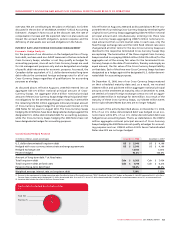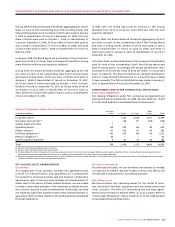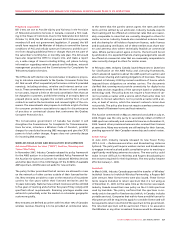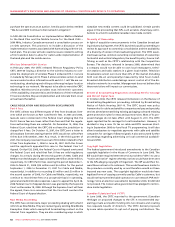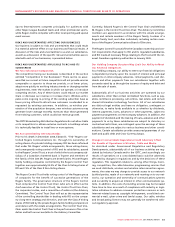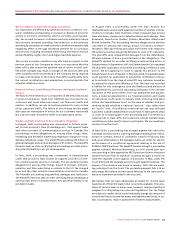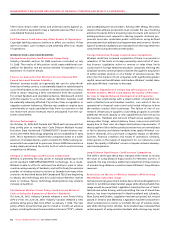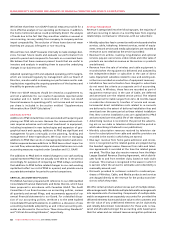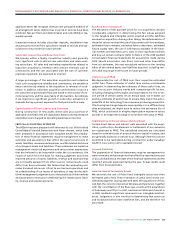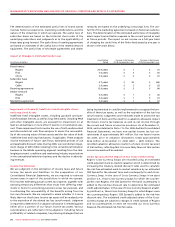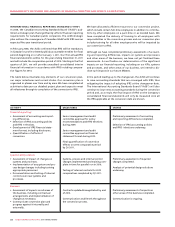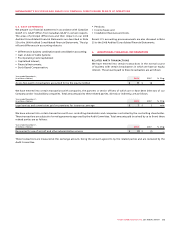Rogers 2008 Annual Report Download - page 67
Download and view the complete annual report
Please find page 67 of the 2008 Rogers annual report below. You can navigate through the pages in the report by either clicking on the pages listed below, or by using the keyword search tool below to find specific information within the annual report.
ROGERS COMMUNICATIONS INC. 2008 ANNUAL REPORT 63
MANAGEMENT’S DISCUSSION AND ANALYSIS OF FINANCIAL CONDITION AND RESULTS OF OPERATIONS
We Are Subject to General Economic Conditions.
Our businesses are affected by general economic conditions, con-
sumer confidence and spending. A recession or decline in economic
activity or economic uncertainty, which is currently occurring glob-
ally, has eroded consumer confidence and may materially reduce
discretionary consumer spending. Any reduction in discretionary
spending by consumers or weak economic conditions may materially
negatively affect us through decreased demand for our products
and services including decreased advertising, decreased revenue
and profitability, higher churn and higher bad debt expense.
The current economic conditions may also have an impact on the
pension plans of the Company as there is no assurance that the
plans will be able to earn the assumed rate of return. As well, mar-
ket driven changes may result in changes in the discount rates and
other variables which would result in the Company being required
to make contributions in the future that differ significantly from
the current contributions and assumptions incorporated into the
actuarial valuation process.
Network Failures Could Reduce Revenue and Impact Customer
Service.
The failure of the networks or a component of the networks would,
in some circumstances, result in an indefinite loss of service for our
customers and could adversely impact our financial results and
position. In addition, we rely on business partners to carry certain
of our customers’ traffic. The failure of one of these carriers might
also cause an interruption in service for our customers that would
last until we could reroute the traffic to an alternative carrier.
We Are and Will Continue to Be Involved in Litigation.
In August, 2008, a proceeding was commenced in Ontario pursu-
ant to that province’s Class Proceedings Act, 1992 against Cable
and other providers of communications services in Canada. The
proceedings involve allegations of, among other things, false,
misleading and deceptive advertising relating to charges for long-
distance telephone usage. The plaintiffs are seeking $20 million in
general damages and punitive damages of $5 million. The plaintiffs
intend to seek an order certifying the proceedings as a class action.
Any potential liability is not yet determinable.
In June, 2008, a proceeding was commenced in Saskatchewan
under that province’s Class Actions Act against providers of wire-
less communications services in Canada. The proceeding involves
allegations of, among other things, breach of contract, misrepre-
sentation and false advertising in relation to the 911 fee charged
by us and the other wireless communication providers in Canada.
The Plaintiffs are seeking unquantified damages and restitution.
The Plaintiffs intend to seek an order certifying the proceeding as a
national class action in Saskatchewan. Any potential liability is not
yet determinable.
In August 2004, a proceeding under the Class Actions Act
(Saskatchewan) was brought against providers of wireless commu-
nications in Canada. Since that time, similar proposed class actions
have also been commenced in Newfoundland and Labrador, New
Brunswick, Nova Scotia, Québec, Ontario, Manitoba, Alberta and
British Columbia. The proceeding involves allegations by wireless
customers of, among other things, breach of contract, misrepre-
sentation, false advertising and unjust enrichment with respect to
the system access fee charged by Wireless to some of its customers.
The plaintiffs seek unquantified damages from the defendants.
Wireless believes it has a good defence to the allegations. The
plaintiffs applied for an order certifying a national class action in
Saskatchewan. In September 2007, the Saskatchewan Court granted
the plaintiffs’ application to have the proceeding certified as a class
action. We are applying for leave to appeal this decision to the
Saskatchewan Court of Appeal. In February 2008, the Saskatchewan
Court granted our application to amend the certification order so
as to exclude from the class of plaintiffs any customer bound by
an arbitration clause with Wireless or Fido. We have not recorded
a liability for this contingency since the likelihood and amount of
any potential loss cannot be reasonably estimated. If the ultimate
resolution of this action differs from our assessment and assump-
tions, a material adjustment to our financial position and results
of operations could result. In January 2009, a hearing took place
before the Saskatchewan Court on the issue of whether this pro-
ceeding should establish a national “opt-out” class rather than
an “opt-in” class. If certified as a national opt-out class, affected
customers outside Saskatchewan would have to take specific steps
in order to not participate in the proceeding and if certified as a
national opt-in class, affected customers outside Saskatchewan
would have to take specific steps to participate. We are awaiting a
decision from the Court.
In April 2004, a proceeding was brought against Fido and other
Canadian wireless carriers claiming damages totalling $160 million,
breach of contract, breach of confidence, breach of fiduciary duty
and, as an alternative to the damages claims, an order for specific
performance of a conditional agreement relating to the use of
38 MHz of MCS Spectrum. The plaintiff has also brought a proceeding
against Inukshuk Wireless Partnership, our 50% owned joint ven-
ture asserting a claim against the MCS Spectrum licences that were
transferred from Fido to Inukshuk. Inukshuk brought a motion to
have the separate action against it dismissed. In May, 2008, the
Court dismissed the separate action brought against Inukshuk. The
appeal of this decision was heard in January, 2009. We are await-
ing a decision from the Court. The proceeding against Fido is at an
early stage. We believe we have good defences to the claim and no
amounts have been provided in the accounts.
We believe that we have adequately provided for income taxes
based on all of the information that is currently available. The calcu-
lation of income taxes in many cases, however, requires significant
judgment in interpreting tax rules and regulations. Our tax filings
are subject to audits which would materially change the amount of
current and future income tax assets and liabilities and could, in cer-
tain circumstances, result in assessment of interest and penalties.


